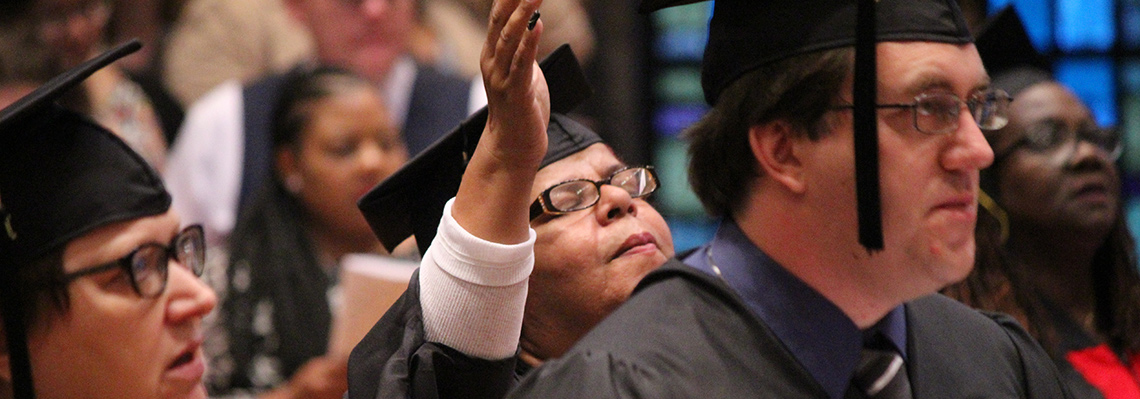Connect real life with real theology.
Flexible and Innovative
The Master of Arts in Chaplaincy is a 72-credit degree program that prepares students to work as chaplains in various settings, including health care, hospice care, public service, prisons, educational and corporate settings. The program combines in-depth academic work with practical application to ensure students are ready for the field of chaplaincy. Students may choose to specialize in hospice and palliative care through the specialized Palliative Care Track offered within the degree program by taking Intro to Palliative Spiritual Care as an elective.
HERE’S WHAT IT TAKES
Our Master of Arts in Chaplaincy is a 72-credit degree program. There are 69 required credits along with 3 credits. You can finish in three years by taking 10–13 credits per semester or finish in four to six years by taking fewer than ten credits per semester.
Flexible and Innovative
Our fully accredited MMin program is designed to fit your busy schedule.
You have full-time and part-time options.
You can choose to take courses online or in person on either campus in Bethlehem and Lancaster.
We offer a weekend schedule with classes on Friday evenings and Saturday mornings that is ideal for working adults.
Weekday classes are held on Monday, Tuesday, and Thursday at 4:00 p.m. and 7:00 p.m. and on Friday starting at 7:00 p.m. No classes are held on Wednesday. Saturday classes are held at 9:00 a.m and sometimes at 11:15 a.m.
LEARNING OUTCOMES
A – Interpret sacred and theological texts, artifacts, and practices of one’s own and other relevant traditions with sensitivity to literary, historical, and cultural contexts, and to the social and spiritual implications of interpretation.
B – Assess the social, ecological, economic, political, cultural, and interreligious dynamics of diverse contexts of ministry through local engagement and global awareness.
C1 – Critically and constructively reflect on one’s understanding and experience of the divine, the self, and others within the theologies and spiritualities of one’s own tradition and in conversation with others.
C2 – Articulate and practice a theological and ethical understanding of authority, power, and accountability that recognizes, supports, and affirms the dignity and worth of all persons.
D1 – Cultivate and apply appropriate liturgical, administrative, and relational leadership practices that foster healing, discernment, and empowerment of individuals and communities in the settings to which they are called.
D2 – Demonstrate proficiency in using disciplinary-appropriate methods for research, critical analysis, and professional performance.
COURSES REFLECT CONTEMPORARY REALITIES
This is an interdisciplinary, cross-school degree program. Three required courses are cross-registered with the School of Behavioral Health.
REQUIRED COURSES:
Introduction to Theological Education
This course will introduce new students to the diversities present in the Seminary community and to institutional commitments toward forming a supportive community of learning and theological reflection. Students will be introduced to anti-racist frameworks, power, and privilege dynamics (to include the intersections of gender, sexuality, socio-economic class, abilities, etc.), and the role of language (inclusivity, pronouns, etc.) to include or exclude others. It will also introduce students to contemplative spiritual practices and theological writing.

